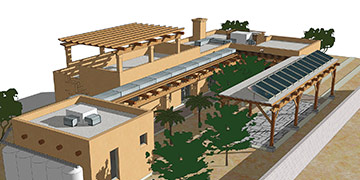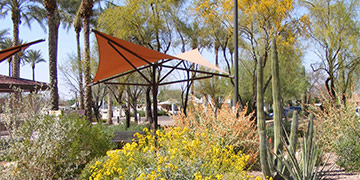ASU Sustainability Education
Arizona State University’s commitment to help create a sustainable world means that sustainability is studied throughout the curriculum.

Complex Adaptive Systems
The School of Human Evolution and Social Change, the School of Life Sciences, and the School of Sustainability offer a Complex Adaptive Systems Science Concentration for doctoral students. Complex adaptive systems science is the study of interactive and dynamic systems that change over time. This concentration is available to PhD students in six doctoral programs in the three Schools.

Business
W. P. Carey School of Business designed the Bachelor of Arts in Business with a concentration in sustainability for students to learn how to align sustainability with a profitable approach to business planning. Classes are taught in conjunction with the School of Sustainability and are also offered by the New College of Interdisciplinary Arts and Sciences. Students can also earn a Doctorate in Economics with a specialization in Environmental and Resource Economics.

Environmental Design and Planning
The Herberger Institute for Design and the Arts offers a Doctorate in Design, Environment, and the Arts that addresses sustainable design challenges and interdisciplinary research. The program provides experiences for those pursuing careers in environmental and energy issues, as well as for those wishing to teach in the architecture, art, or design fields.
Engineering
Ira A. Fulton Schools of Engineering provide a full range of degree programs in sustainable engineering and related fields. The School of Sustainable Engineering and the Built Environment addresses society’s critical need for sustainable infrastructure. Students in the School for Engineering of Matter, Transport, and Energy can earn a concentration in energy and environment. The School also offers a Professional Science Master’s in Solar Energy Engineering and Commercialization. Students select courses in the technical and nontechnical tracks like energy policy and applied research. Students interested in clean energy production can obtain degrees in Materials Science and Engineering.

Urban and Environmental Planning
The School of Geographical Sciences and Urban Planning provides an interdisciplinary Master of Urban and Environmental Planning degree that includes sustainable urban design, urban policy, environmental planning, transportation, and international planning among its areas of focus.

Designing the Built Environment
The School of Architecture + Landscape Architecture within the Herberger Institute for Design and the Arts offers a Master of Science in the Built Environment (MSBE) degree with a concentration in energy performance and climate-responsive architecture.

Applied Ethics and the Professions
ASU’s Lincoln Center for Applied Ethics offers a Master of Arts in Applied Ethics and the Professions with a sustainability-related concentration in Science, Technology, and Ethics. The program focuses on ethical issues arising from balancing economic, technological, environmental, social, and cultural development in a world increasingly affected by science and technology.
Computer Sciences and Systems Engineering
The School of Computing, Informatics, and Decision Systems Engineering offers sustainability-related electives in the Bachelor of Science in Engineering Management program. Students can also integrate biology, urban planning, anthropology, and public health with computer and information sciences in the Computer Science degree. Students can earn a Bachelor of Science in Electrical Engineering with a focus on alternative energy systems from the School of Electrical, Computer and Energy Engineering.

Interdisciplinary Studies
The School of Letters and Sciences offers the Bachelor of Interdisciplinary Studies with a sustainability concentration. Students approach sustainability through multiple viewpoints with intellectual cohesion and engaged problem solving. The sustainability concentration can be coupled with a required second concentration like business, biochemistry, geography, and justice studies. A sustainable tourism concentration is also available. Students can connect tourism with local and global sustainable development.

Environmental Social Sciences
The College of Liberal Arts and Sciences offers a Doctorate in Environmental Social Sciences with a focus on urbanism. This degree uses a social sciences lens to reduce human impacts on the environment and develop a more sustainable world. Students can address issues on urbanism by analyzing culture, environmental justice, political ecology, science and technology, and environmental hazards.

Environmental Humanities
The departments of English in the College of Liberal arts and Sciences and Interdisciplinary Humanities and Communication in the School of Letters and Sciences offer a Certificate in Environmental Humanities. Students gain theoretical and practical knowledge to guide meaningful social and environmental change, make informed decisions on sustainable personal lifestyles, and create ecologically responsible public policy.
Ethnicity, Gender, and Race Studies
The New College of Interdisciplinary Arts and Sciences provides a certificate and a Bachelor of Arts in Ethnicity, Race and First Nations Studies. The certificate and degree are designed for students who plan to work and live in ethnically diverse communities and seek to acquire the skills for understanding the complexities of race, class, and gender at a local or national level. The College also provides a Bachelor of Arts and a minor in Women and Gender Studies. Students can also obtain a minor in Ethnic Studies.


 Ira A. Fulton Schools of Engineering provide a full range of degree programs in sustainable engineering and related fields. The School of Sustainable Engineering and the Built Environment addresses society’s critical need for sustainable infrastructure. Students in the School for Engineering of Matter, Transport, and Energy can earn a concentration in energy and environment. The School also offers a Professional Science Master’s in Solar Energy Engineering and Commercialization. Students select courses in the technical and nontechnical tracks like energy policy and applied research. Students interested in clean energy production can obtain degrees in Materials Science and Engineering.
Ira A. Fulton Schools of Engineering provide a full range of degree programs in sustainable engineering and related fields. The School of Sustainable Engineering and the Built Environment addresses society’s critical need for sustainable infrastructure. Students in the School for Engineering of Matter, Transport, and Energy can earn a concentration in energy and environment. The School also offers a Professional Science Master’s in Solar Energy Engineering and Commercialization. Students select courses in the technical and nontechnical tracks like energy policy and applied research. Students interested in clean energy production can obtain degrees in Materials Science and Engineering. The School of Computing, Informatics, and Decision Systems Engineering offers sustainability-related electives in the Bachelor of Science in Engineering Management program. Students can also integrate biology, urban planning, anthropology, and public health with computer and information sciences in the Computer Science degree. Students can earn a Bachelor of Science in Electrical Engineering with a focus on alternative energy systems from the School of Electrical, Computer and Energy Engineering.
The School of Computing, Informatics, and Decision Systems Engineering offers sustainability-related electives in the Bachelor of Science in Engineering Management program. Students can also integrate biology, urban planning, anthropology, and public health with computer and information sciences in the Computer Science degree. Students can earn a Bachelor of Science in Electrical Engineering with a focus on alternative energy systems from the School of Electrical, Computer and Energy Engineering. The New College of Interdisciplinary Arts and Sciences provides a certificate and a Bachelor of Arts in Ethnicity, Race and First Nations Studies. The certificate and degree are designed for students who plan to work and live in ethnically diverse communities and seek to acquire the skills for understanding the complexities of race, class, and gender at a local or national level. The College also provides a Bachelor of Arts and a minor in Women and Gender Studies. Students can also obtain a minor in Ethnic Studies.
The New College of Interdisciplinary Arts and Sciences provides a certificate and a Bachelor of Arts in Ethnicity, Race and First Nations Studies. The certificate and degree are designed for students who plan to work and live in ethnically diverse communities and seek to acquire the skills for understanding the complexities of race, class, and gender at a local or national level. The College also provides a Bachelor of Arts and a minor in Women and Gender Studies. Students can also obtain a minor in Ethnic Studies.